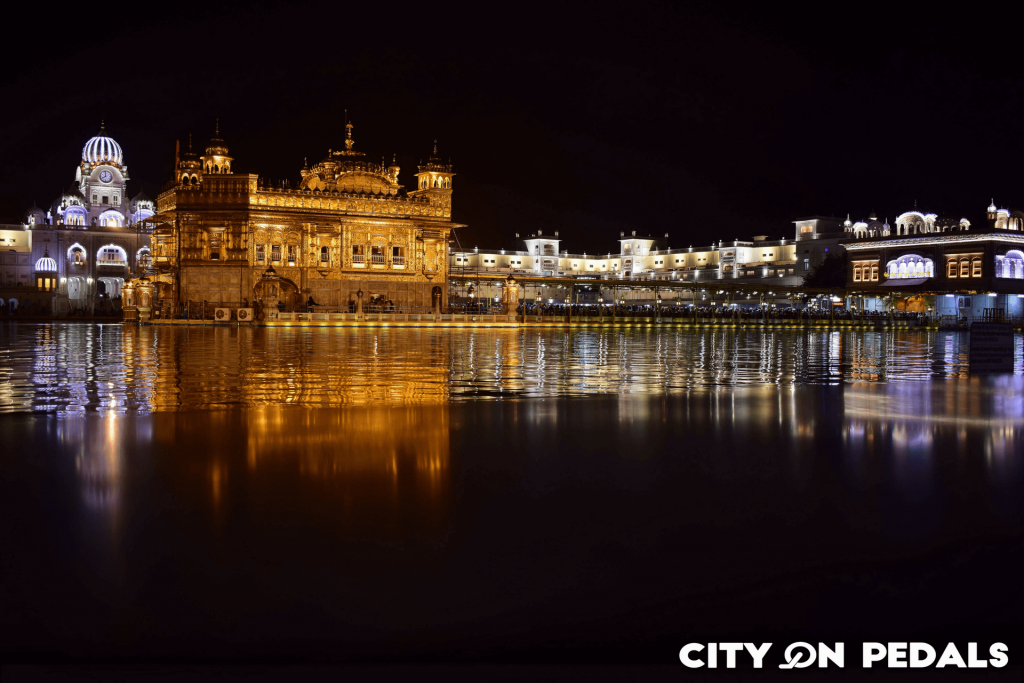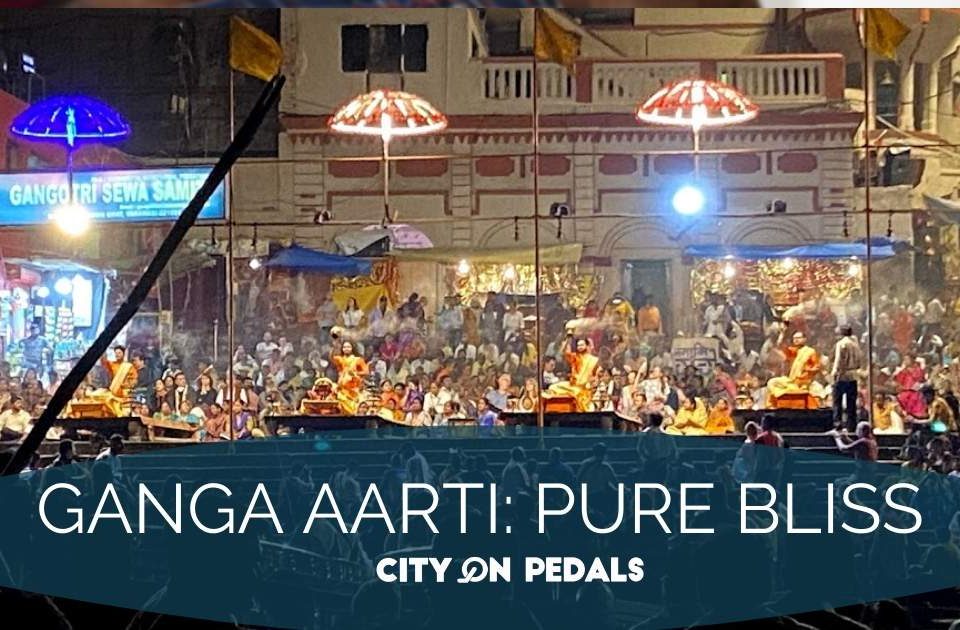- Use promo code "CPT10" & get 10% off on tours
- traveldesk@cityonpedals.com
550th Guru Nanak Jayanti Celebrations

Guru Nanak Dev Ji, Baba Nanak or Nanak Shah – all are the names of the first of the Ten Gurus of Sikhs who is actually the founder of Sikh religion in the world. Sikhs believe that all subsequent Gurus possessed Guru Nanak’s divinity and religious authority. Considered as one of the august religious thinkers, his thoughts, views, and words have been cataloged in the form of 974 poetic hymns, which came to be known as “Shri Guru Granth Sahib Ji” – the holy book of the Sikhs.
Born in 1469 in the village of “Rai Bhoi di Talwandi” (now called Nankana Sahib) in modern-day Pakistan, to a family that originally belonged to the Hindu Khatri caste. His father, Mehta Kalyan Das Bedi, was a patwari (accountant) for the village of Talwandi employed by a local Muslim landlord and Guru Nanak’s mother was called Tripta Devi and his elder sister was, Bebe Nanaki. Belonged to the Bedi clan – “those who study the Vedas”, Guru Nanak’s family believed in simple living and they were the staunch believer of the system. But from a very young age, Guru Nanak Dev Ji has always surprised his teachers with his questions about God so much so that these led many to recognize his affinity with religious matters. He also refused to wear “Janaeu” – the sacred thread of Hindus on the pretext that men commit countless adulteries and then put Janaeu and when it becomes old we throw it away and another is put on.
The post will throw some light on the following key points:
- Why Guru Nanak Dev Ji Was Called Guru?
- Teachings of Guru Nanak Dev Ji
- Why Do We Celebrate His Birthday As Prakash Purabh?
- Why Guru Nanak Jayanti Is Celebrated In The Month Of November?
- Importance Of Celebrating Gurpurab In 2019
- India To Celebrate 550th Birth Anniversary Of Shri Guru Nanak Dev Ji
- Highlights Of The Planned Celebrations
- Recent Updates
Why Guru Nanak Dev Ji Was Called Guru?
Considered as a religious innovator, he advocated the existence of One God and has always taught that every human being can reach out to God with meditation and performing pious practices. It is part of Sikh religious belief that the spirit of Guru Nanak’s sanctity, divinity, and religious authority descended upon each of the nine subsequent Gurus when the Guruship was devolved on to them. Thus He is revered as Guru by one and all. Sikhs give the utmost importance to the writings of the Guru Sahib in Guru Granth Sahib, the holy book that is revered as the 11th and perpetual guru.
Teachings of Guru Nanak Dev Ji
He famously quotes and taught everyone the art of expressing oneself, “Speak only that which will bring you honor.” Guru Sahib gave the three guiding principles to everyone – Naam Japna, Kirat Karni, and Vand Chhakna.
Naam Japna means – to recite and repeat the name of God.
Kirat Karni means – to work to gain one’s livelihood.
Vand Chhakna means – sharing with others what one eats or earns.
Guru Nanak’s own words in Guru Granth Sahib state that his teachings are as he has received them from the Creator Himself. The critical event of his life in Sultanpur, when he returned after three days with enlightenment, also supports this belief.
Why Do We Celebrate His Birthday As Prakash Purabh?
Most Sikh festivities are centered around the birth of their ten Gurus, who helped shape the religion and preach the importance of religious devotion. As the name suggests, Guru Nanak Gurpurab celebrates the birth anniversary of Guru Nanak Dev Ji, who is the first Guru of the Sikhs and the founder of Sikhism. Thus, it is a Sikh festival that is celebrated with a lot of fervor and excitement in many parts of India by Sikh and Punjabi communities alike. This year, it will be on the 12th of November which is a Tuesday and will mark the 550th birth anniversary of Guru Nanak Dev Ji.
Why Guru Nanak Jayanti Is Celebrated In The Month Of November?
There is a variance among various scholars and religious groups over the date of celebrating this festival. Some believe that it should be celebrated at the festival of Vaisakhi, on the 14th of April which is also in accordance with the Nanakshahi calendar provided by Sri Akal Takht (Golden Temple, Amritsar). But according to Bhai Bala Ji, who is supposedly Guru Nanak’s childhood friend and a devotee of his teachings, he was born on the Full Moon of the Lunar Month Kartik. This is the reason that Gurpurab is celebrated in the month of November.
Importance Of Celebrating Gurpurab In 2019
Since the year marks the 550th celebrations of the festival of the revered Guru, the Government of both India and Pakistan has taken this initiative to make it a year-long celebration starting from Nov 23rd, 2018, wherein the main function will be held at Sultanpur Lodhi from Nov 9th, 2019 onwards. Last November, both India and Pakistan agreed to set up the Kartarpur corridor to link the historic Gurdwara Darbar Sahib – the final resting place of Guru Nanak – in the Pakistani town of Kartarpur with Dera Baba Nanak in Punjab’s Gurdaspur district. For this several development projects have been undertaken and an agreement is signed between both the countries that will allow approx 5000 Indian pilgrims daily to undertake a visa-free visit to Gurdwara Darbar Sahib, the shrine of the Sikh religion’s founder Guru Nanak Dev in Pakistan.
India To Celebrate 550th Birth Anniversary Of Shri Guru Nanak Dev Ji

In a grand and peaceful manner along with State Governments and the Indian Missions abroad, Guru Nanak Devji’s teachings of love, peace, equality, and brotherhood will have eternal value in their true sense this year. The Government of both countries has taken initiatives to plan the event in the best possible way.
Highlights Of The Planned Celebrations
Development of Kartarpur Sahib Corridor
In order to facilitate pilgrims from India to visit Gurdwara Darbar Sahib Kartarpur on the banks of the Ravi river, in Pakistan, the Government has developed a corridor from Dera Baba Nanak in Gurdaspur district to the International border, with all modern amenities. The same kind of corridor is maintained on another side of the border as well.
Development of Sultanpur Lodhi
The historic town of Sultanpur Lodhi, associated with the life of Shri Guru Nanak Dev Ji, shall be developed as a heritage town on the Smart City principles. As a major attraction for pilgrims and tourists, a heritage complex at Sultanpur Lodhi, “Pind Babe Nanak da” – The Village of Guru Nanak, will be established to depict life in the times of Guru Sahib. Even Sultanpur Lodhi railway station is also upgraded with all the modern amenities.
Centre for interfaith studies and Chairs in foreign Universities
A center for interfaith studies will be set up at Guru Nanak Dev University, Amritsar. Chairs on Shri Guru Nanak Devji will be set up in one University each in UK and Canada. An International seminar on the life and teachings of Shri Guru Nanak Devji will be organized in New Delhi.
Global Celebrations Throughout The Country
Indian missions overseas will organize special events to celebrate the 550th Birth Anniversary of Shri Guru Nanak Dev ji.
Commemorative coin and stamps
Commemorative coins and postage stamps will be released by the Government to mark this momentous occasion.
Religious activities and publications
Religious activities will be organized throughout India. Doordarshan will telecast programs on Shri Guru Nanak Devji and the Gurbani. National Book Trust will publish Gurbani in different Indian languages. UNESCO will be requested to publish Shri Guru Nanak Devji’s writings in world languages.
Special train for pilgrims
Ministry of Railways will run a train passing through the various holy places associated with Shri Guru Nanak Devji, for pilgrims and tourists.
Recent Updates
- As many as 84 heads of foreign missions from New Delhi led by Union minister Hardeep Singh Puri on Tuesday, Oct 22, 2019, visited the Golden Temple to take part in celebrations of the 550thbirth anniversary of Sikhism’s founder, Guru Nanak Dev Ji. The countries whose heads of foreign missions visited the shrine included Afghanistan, Australia, Bhutan, Cambodia, Georgia, Greece, Iceland, Israel, Kuwait, Malaysia, Mexico, South Africa, Spain, Sri Lanka, New Zealand, USA, Nepal.
- National Carrier Air India has painted ‘Ek Onkar’ symbol on its Boeing 787 Dreamliner aircraft’s tail to mark the 550th birth anniversary of Guru Nanak Dev. The aircraft completed its first flight on October 31 from Amritsar to London. It will fly only on Monday, Thursday, and Saturday.
- As per the recent updates, Pakistan issued commemorative 50 rupees coins on Wednesday, Nov 30th, 2019. Nankana Sahib Gurdwara, a site sacred to Sikhs, is inscribed on one side of the coins with the words ‘550th birthday celebrations’ and ‘Sri Guru Nanak Dev Ji’ embossed on the edges. The other side illustrates Pakistan’s emblem, a crescent, and star, with the ‘Islamic Republic of Pakistan’ etched in Urdu. According to officials, the 50 rupees coin will be available to pilgrims at the Kartarpur Sahib, along with postal stamp worth Rs8 – (excerpts of the news published by World Asia on Oct 30, 2019).
- As per the recent news, the first batch of 1100 Sikhs from India has already crossed over in Pakistan from Wagah Border on Thursday, Nov 31st, 2019 for the 550th birth anniversary celebrations of Guru Nanak Dev Ji. The visiting Sikhs will also be a part of the historic opening of the Kartarpur Corridor on November 9.
Indian pilgrims of all faiths and people of Indian origin can use the corridor and the travel will be visa-free. Each visitor would be required to pay USD 20 as a fee, though India has requested Pakistan not to charge the Indian pilgrims on which the Pakistan PM has accepted the requested and waiver fees for Indian Sikh pilgrims.
The opening of religious passage would connect Pakistan’s Kartarpur with Dera Baba Nanak shrine in India’s Gurdaspur district and actualize decades-old wish of the Sikh community.






